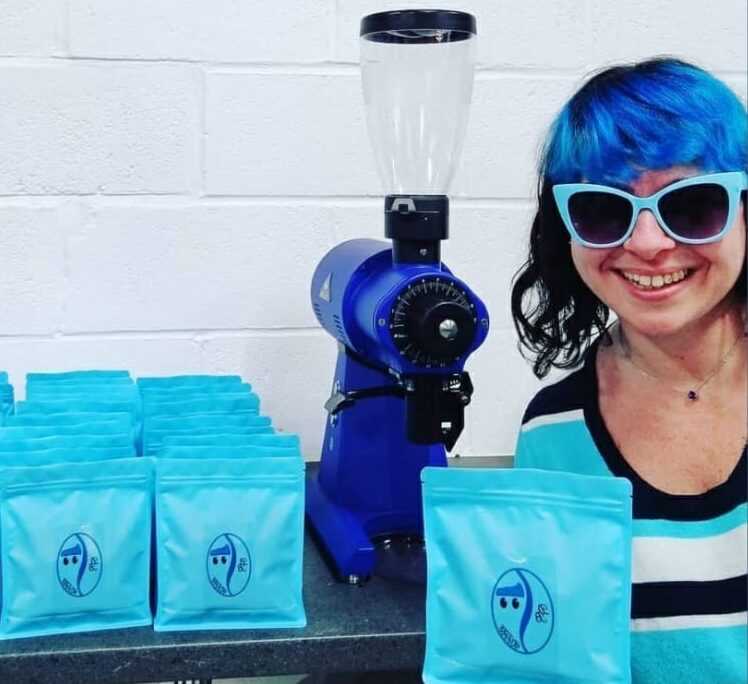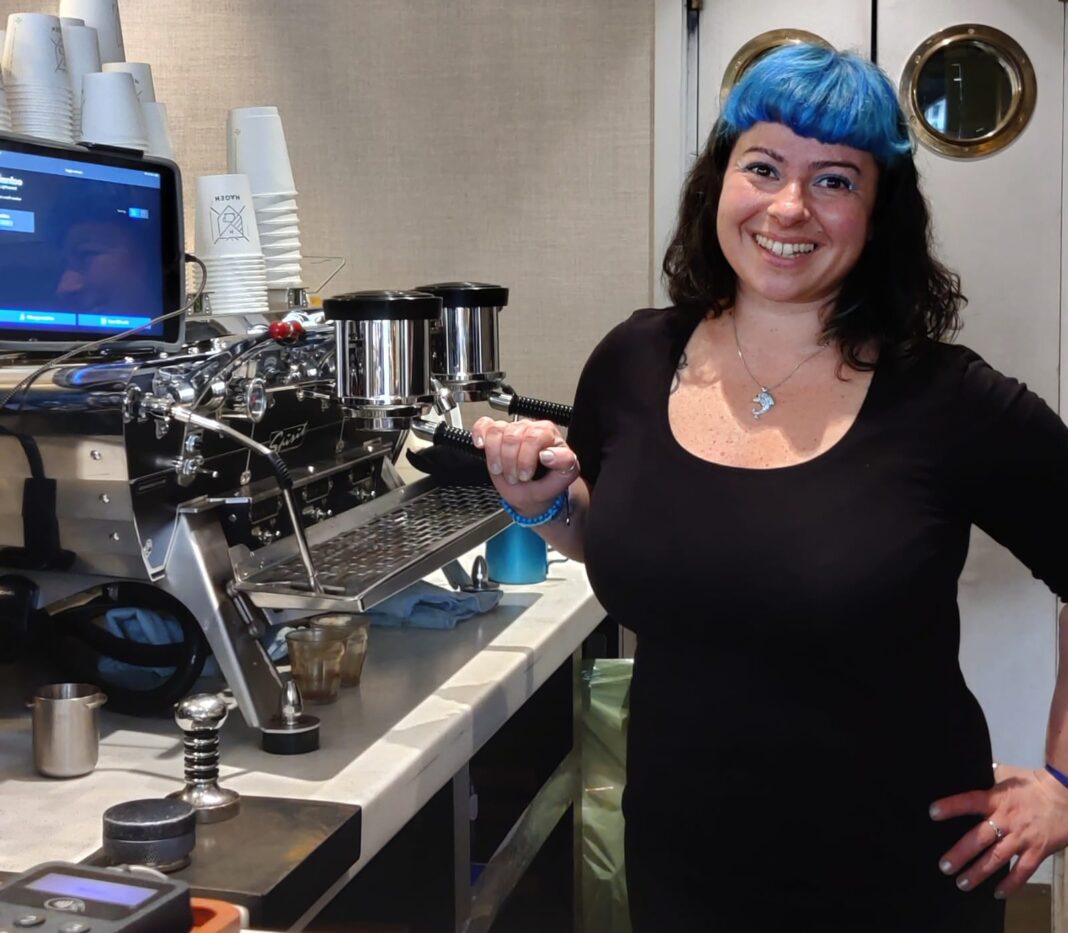MILAN – Once again we travel across the Channel to talk to Deborah Cesanelli – known as Debbyblu – head barista at Hagen Espresso Bar London. Having emigrated to London from the Marche province, after years of experience behind the bar, cultivating a contagious passion for specialities, her smile and her unmistakable blue quiff are the added quid in the coffeeshop where she works, frequented by VIPs and film stars whom she has managed to conquer with her cappuccinos.‘
Deoborah Cesanelli, a life for quality coffee
“I started working in the sector after leaving the Hotel Institute, working as a waitress for the first time. After a few years I took a job as a barista, and from there I started to get interested in coffee, about which I knew practically nothing. After 4/5 years, I moved to another bar and worked for 18 years in Macerata. In this context I had the opportunity to attend courses on coffee, latte art, all free of charge and offered by the roasters. I discovered Sigep, I saw the competitions and when I attended the competitions in person in Rimini another world opened up to me. I got hooked and wanted to follow the Sca. ”
Why and when did you leave for London?
“Because I was lucky enough to meet Francesco Sanapo, who was actually one of the bartenders I saw perform at Sigep: he was the one who selected me through a jury in 2015 in the Barista & Farmers talent among 10 bartenders in Honduras. From there, the spring to leave outside Italy was triggered within me: after that experience I thought I had reached the maximum possible experience in Italy and it was time to go to London. I had never had the courage to leave everything and go: after a year following the 18 days on the plantation, I woke up in the morning without the desire to go to work. A change was needed and so I left, leaving a permanent job, my house, my boyfriend and my friends.
I have no regrets. In fact, if I went back, I would probably leave even earlier. In London I found a job already looking for offers in Italy: I already knew I wanted to work in a specialty coffee shop. When I arrived I started at Coffee, Cake & Kisses, I only had school English on my side. Then I moved on to Muni Coffee Company and finally to my current job at Hagen Espresso Bar, which has 5 locations in all, of which I run the one in Piccadilly. In short, I wanted to live and work in central London and I did.
I work with the specialties, with V60, pour over, in contact with many coffee lovers who ask about the origin, information about the drink. It’s a very different environment from Italy.”
What is the specialty scene like in London?
Deborah Cesanelli describes it enthusiastically: “It’s impressive. Even the street sweeper can easily ask you for a natural, V60-washed Ethiopia. It’s completely normal. There are coffee shops practically everywhere and there are still plenty of them opening. Take my owner, who in three years has opened four coffee shops on his own. Without losing his intimate, artisanal soul.
I am the head bartender and I manage the place and the staff. Each place has its own head bartender. It was an important leap for me: I feel the coffee shop as if it were my own. Customers choose to come to this place specifically for me and not for the coffee shop itself. Honestly, it’s a personal satisfaction. In Italy, the customers who came to me came from Macerata. Here they come from all over the world.
Deborah Cesanelli, we are told that film stars come to drink your cappuccino…
“They come to have a chat with me and for my coffee and I often don’t even recognise them. It’s a bizarre thing. The most striking example was with the actor from Harry Potter: for three months I talked to him and we became friends without me realising who he really was. Instead, as my colleagues pointed out to me, it was really him. The day after I realised this, when he came back for breakfast, I was very excited, while he was acting calmly. My hands were shaking. I asked him if it was really him: we laughed together.
The first VIP was Hugh Grant. I couldn’t even take the order. And now he knows who I am. I converted him with the cappuccino: he always ordered tea and orange juice, and his partner always ordered milk. One day, when he was sitting outside, I saw him tasting his girlfriend's cappuccino. I was terrified: he liked the cappuccino and ordered one for himself. He never had tea again.”
Chapter staff: how is the UK doing?
“Before Covid there was a lot of qualified, high-level staff. During the pandemic a lot of people went back to Australia, New Zealand and Italy. Here too there is a shortage of staff and we are struggling to find them.
We are training the employees ourselves. It’s also complicated for some people to return, because they need a Visa paid for by the owner to come back. Those who had the necessary documentation, which is called pre seattle status and seattle, can stay for 5 years and then indefinitely. All others are no longer in compliance. However, there are job offers popping up everywhere. They’ve even raised the basic pay to find someone. But it remains a bit complicated.
The way I see it, most bartenders and consumers are more aware and educated about the drink than in Italy. It doesn’t surprise me anymore, but the first year here, I was shocked to receive questions from customers. Many Italians who go to work for Italians always choose it as a plan b. The English, on the other hand, look for speciality coffee because they want to work with that drink and those extractions. Otherwise they go to the chains.”
Deborah Cesanelli, how is espresso perceived?
“It’s gold. A good espresso is gold. Some people even ask me for real Italian espresso. They love it, even after lunch. The double shot, a small Italian-style ritual, is very popular in specialty bars. Otherwise, flat white and cappuccino are also very popular. It is synonymous with quality, it recalls the Italian way of life: everyone loves Italy from north to south. They seem to be talking about a small diamond. Here espresso sells for two pounds 60 the normal single origin, if it is espresso a guest (we had Gardelli for almost a year) two pounds 85. No one has ever complained. The machines we use are a Victoria Arduino grinder, and the Slim Jim Spirit from Netherland. ”
Unesco? How do you feel about this possible recognition?
“As I read about the news, I was puzzled. But if you only refer to its history, its tradition, then it may be right. If all baristas made a quality espresso, it would be even better. I prefer to see it as an enhancement of an all-Italian cultural trait, which even here is recognised as a symbol of Italian-made products.”
Deborah Cesanelli, what are your future plans?

“I intended to open my own restaurant when I was still in Italy, but it was always complicated because of the bureaucracy and to do it without help. Now that I'm here I already have my own brand of coffee, D.b coffee. I also have to keep up to date on social media. I get my coffee from Guatemala, roast it in London and then sell it. The reason for choosing Guatemala again is linked to my experience in Honduras, where I met a local girl who now lives in America. I contacted her again recently because she belongs to a family of farmers with whom I now work.
I threw myself into this adventure and also experimented with roasting. I organised a trip to Guatemala with her for 18 days and it was a blast: we visited 52 coffee farms. When we did the cupping I chose three that I liked the most and they were from the same farmer. It was destiny. Until recently I had found some guys to help me roast and then I was followed by Paolo Scimone in the training. I am currently supported by him who helps me learn with We Roast. I will also be attending the course soon.
The only thing missing is the coffee shop: at the moment I really like the work I have. It’s not a problem of costs, which have gone down with Brexit and Covid. When I make up my mind, I could call it either Debby’s coffee or Debby’s blue coffee. Going back to Italy? No. After this experience I wouldn’t be able to work under the same conditions as before. Here they value the person and professionalism, both on the part of the employer and of the clients”.
A message to young people in closing launched by Deborah Cesanelli: “I recommend doing this job to those who have a passion for it. If you bring problems with you behind the counter, this is not the right place for you. Customers come to relax, to get away from their personal issues, and we have to respect their oasis. Training is also essential, and the desire to continually update in order to cultivate your dreams. It is possible to realise them. In short, have the courage to leave, overcoming the fears of leaving your comfort zone. I’ve been afraid too, but you have to try to know what awaits you outside. The home to return to will always be there.”















